
Viktor Robertovich Tsoi was a Soviet singer-songwriter and actor who co-founded Kino, one of the most popular and musically influential bands in the history of Russian music.
Kino is a Russian rock band formed in Leningrad in 1981. The band was co-founded and headed by Viktor Tsoi, who wrote the music and lyrics for almost all of the band's songs, until his death in 1990. Over the course of eight years, Kino released over 90 songs spanning over seven studio albums, as well as releasing a few compilations and live albums. The band's music was also widely circulated in the form of bootleg recordings through the underground magnitizdat distribution scene. Viktor Tsoi died in a car accident in 1990. Shortly after his death, the band broke up after releasing their final album, consisting of songs that Tsoi and the group were working on in the months before his death.
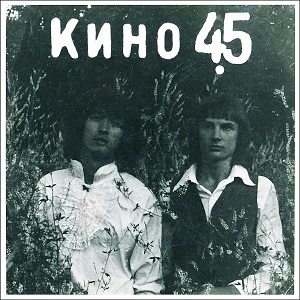
45 is the debut studio album by Soviet rock band Kino. It was recorded in 1982 in the AnTrop studio, owned by Andrei Tropillo and distributed as magnitizdat. At the time, Kino consisted of Viktor Tsoi and Aleksei Rybin. Boris Grebenshchikov provided additional instrumentation and musical production. Other members of Akvarium also helped with recording.

The Garin Death Ray, also known as The Death Box and The Hyperboloid of Engineer Garin, is a science fiction novel by the noted Russian author Aleksey Nikolayevich Tolstoy written in 1926–1927.
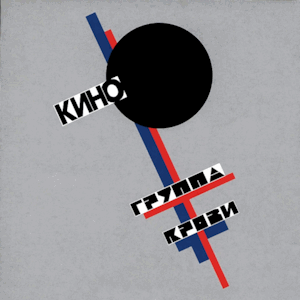
Gruppa krovi is the sixth studio album by Soviet post-punk band Kino, first released in 1988. Released at the height of Perestroika and Glasnost, together with a crime thriller titled The Needle released in the same year starring lead vocalist Viktor Tsoi, it would go on to be the band's most popular album both inside and eventually outside the Soviet Union, with songs from the album, including the title track, commonly being listed among top 100 lists of Russian music.
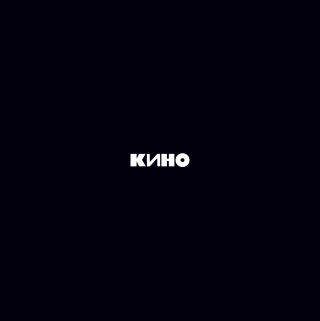
The untitled album is the eighth and final studio album of the Soviet rock group Kino. It was released in December 1990 by Metadigital on vinyl. The rough demo version was recorded in the Latvian village Plieņciems and according to the guitarist of the group Yuri Kasparyan, finished on the 14th of August that year - the day before the death of the frontman Viktor Tsoi in a car crash. The remaining members of Kino completed the album as a tribute to Tsoi.
Alexander Viktorovich Tsoi, also known under the pseudonym Alexander Molchanov is a Russian performer, composer, designer and designer, former guitarist of the band "Para bellvm", author of the video effects of the project "Symphonic Kinot", and leader of the musical project Ronin.

Sergei Alexandrovich Solovyov was a Soviet and Russian film director, producer, screenwriter, and actor. In 1993 he was awarded the People's Artist of Russia title.

Yuri Dmitriyevich Kasparyan is a Russian musician best known for his time as the guitarist of the Soviet rock band Kino and as a member of Vyacheslav Butusov's group U-Piter.
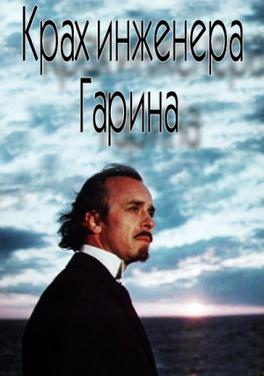
Failure of Engineer Garin is a 1973 Soviet television film in four parts loosely based on a novel Hyperboloid of Engineer Garin by Alexei Tolstoy. Produced by Lenfilm by the order of Gosteleradio of USSR

The Hyperboloid of Engineer Garin also abbreviated as Engineer Garin is a black-and-white 1965 Soviet science fiction film based on Aleksey Tolstoy's novel of the same name.

Assa (Асса) is a 1987 Soviet crime film directed and co-written by Sergei Solovyov. It became a cult film, mainly due to the fact that it was one of the films that brought Russian rock music from the underground into the mainstream. Solovyov made a sequel to the film twenty years later, 2-ASSA-2.
![<i>The Needle</i> (1988 film) 1988 [[Soviet Union]] film](https://upload.wikimedia.org/wikipedia/en/b/bb/The_Needle_film_poster.jpg)
The Needle is a 1988 Soviet thriller film. It stars rock musicians Viktor Tsoi and Pyotr Mamonov. The film premiered on 16 September 1988 in Almaty and in February 1989 in Moscow.
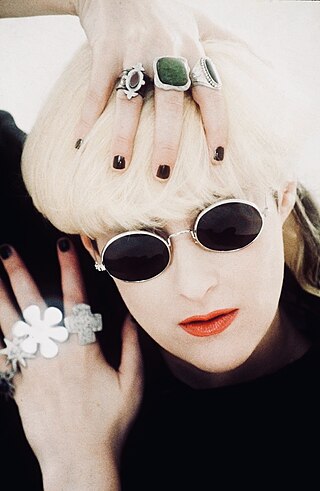
Joanna Stingray is an American singer, actress, music producer and socialite. She was a key figure in popularizing Soviet and Russian rock music and culture in the West in the 1980s.

Leto is a 2018 Russian musical film directed by Kirill Serebrennikov that depicts the Leningrad underground rock scene of the early 1980s. The film draws loosely from the lives of the Soviet rock musicians Viktor Tsoi and Mike Naumenko. It was selected to compete for the Palme d'Or at the 2018 Cannes Film Festival, where it won the Cannes Soundtrack Award. Leto also won the Best Production Designer at the 2018 European Film Awards.
"Khochu peremen!" or "My zhdyom peremen", also simply known as "Peremen!", is a song by the Soviet rock band Kino, written by Viktor Tsoi. It was made famous by its use in the 1987 film Assa in which Kino's lead singer Viktor Tsoi prominently sung the song at the end of the film. The 1989 album Posledniy geroy includes a studio-recorded release of the song.

Posledniy geroy, initially released in France as Le Dernier Des Héros, is an album by Soviet rock band Kino, which is a collection of re-recorded songs by the band. The album is notable for containing one of the band's most famous songs, "Khochu peremen!", which became a Perestroika anthem. The album was first released in France due to the band's newfound popularity abroad.
"Pack of Cigarettes" is a song by the Soviet post-punk band Kino from the album Zvezda po imeni Solntse released in 1988. One of Kino's most popular songs. It was written in 1988, when Viktor Tsoi was filmed in the Needle.
Kogda tvoya devushka bolʹna is a song by the Soviet rock band Kino, included in the "Black Album", released after the death of its author, Viktor Tsoi. The song was actively performed by the band's musicians at apartment concerts since 1988. Tsoi had plans to create a boy band that would perform "pop" songs, including "Kogda tvoya devushka bolʹna". Due to its poppier tone and songwriting, the song was not placed on records at the time of its initial performances. Despite the song also not fitting into the atmosphere of the "Black Album", Kino's musicians believed that the public should hear it.

46 is the second studio album by the Soviet rock band Kino. It was recorded in 1983 at the AnTrop studio. The album consisted of demos of songs written by the band's singer, Viktor Tsoi. It was largely dismissed by Tsoi as a "rehearsal tape" for Nachalnik Kamchatki, with many of the songs in 46 being used in the later album. Despite this, fans viewed it as the band's second album. The band has never recognized it as a legitimate album.
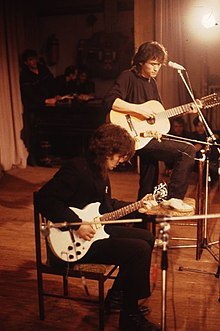










![<i>The Needle</i> (1988 film) 1988 [[Soviet Union]] film](https://upload.wikimedia.org/wikipedia/en/b/bb/The_Needle_film_poster.jpg)



